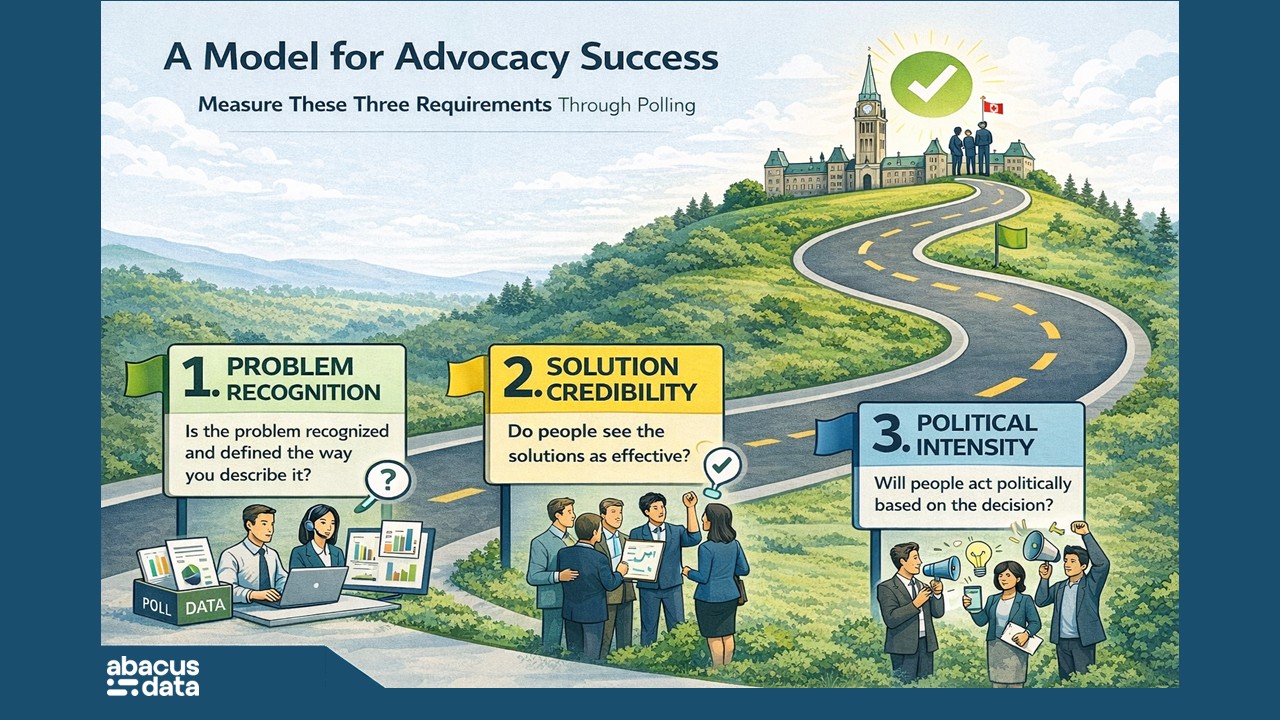Abacus Data Poll: Liberals trail Conservatives by 20 as Public Mood Sours
July 14, 2024
From July 4 to 9, 2024 Abacus Data conducted a national survey of 1,989 Canadian adults exploring several topics related to Canadian politics and current events as part of our regular national omnibus surveys.
In this edition of our Canadian politics tracking, we ask Canadians about the Toronto-St. Paul byelection and who they expect to win the next federal election, along with our usual trackers.
Vote Intention: Conservatives lead by 20 over the Liberals
Since our last survey, not much has changed. If an election were held today, 43% of committed voters would vote Conservatives, while 23% would vote for the Liberals, 18% for the NDP, and 5% for the Greens. The BQ continues to hold 38% in Quebec.
Every party’s vote share is consistent with the last wave, with very minor changes – the Conservatives are up 1 and the NDP are down 1. These changes are within the margin of error.

Regionally, the Conservatives continue to well ahead in all regions and provinces except for Quebec. From our last survey, the Conservatives’ lead over the Liberals in BC, Ontario and SK/MB has increased. They lead now by 30 points in BC (+5), 42 (+6) in SK/MB, and 21 (+4) in ON.
In Quebec, the BQ is ahead of the Liberals by 12-points with the Conservatives in third at 19%.

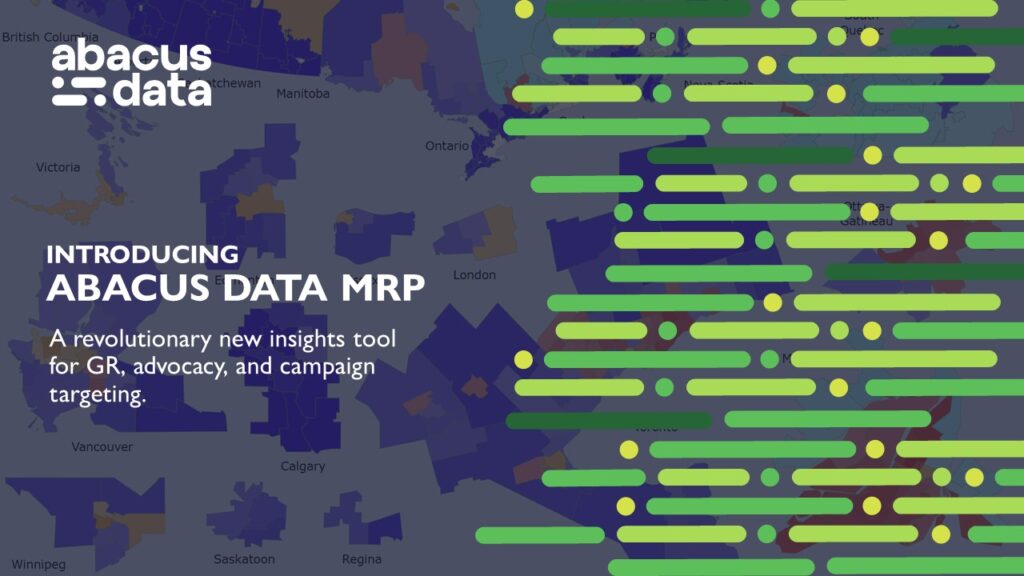
Demographically, the Conservatives continue to lead among all groups. Since our last survey, Conservative support among 18-to-29 is up 6 points (37% vs 31%), as support for the Liberals shrank slightly (1 point down) and support for the NDP increased (2 points up).
Among other age groups, vote intention remains relatively stable. Conservative support is at 45% among 45-to-39 (4 points down), as Liberal support increased by 5 points (25% vs 20%).

As in past surveys, we find little difference in vote intention between men and women. The gender gap that was persistent prior to last month, and continues to be non-existent today.

There hasn’t been a shift in vote intentions nor in the size of the party’s accessible voter pools. The Conservative pool remains more than 10 points larger than the Liberal one.
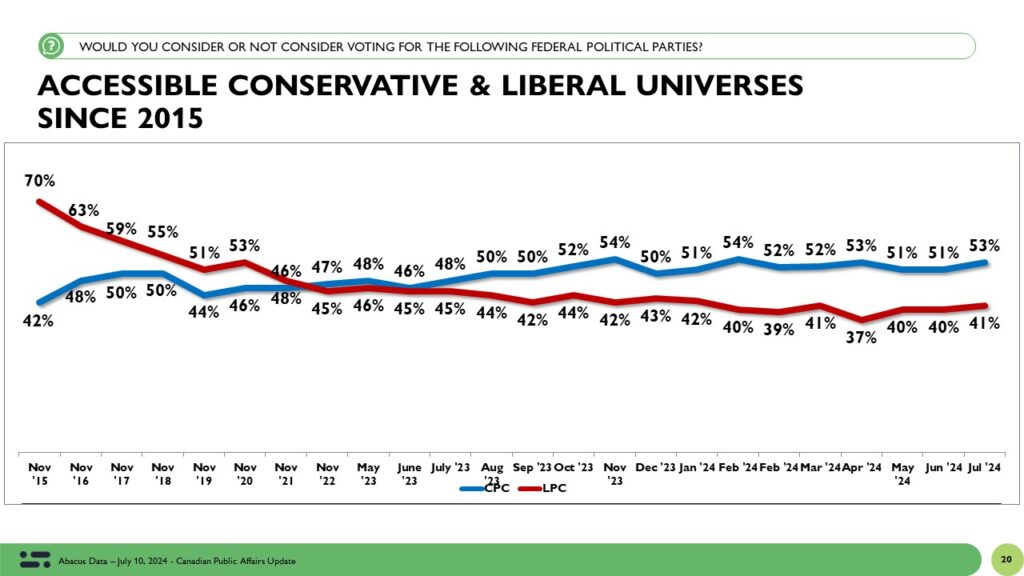

Beyond vote intention, the desire for change remains largely consistent. 85% want change (up 1 point), with 52% believing there’s a good alternative to the Liberals (down 2 poins).
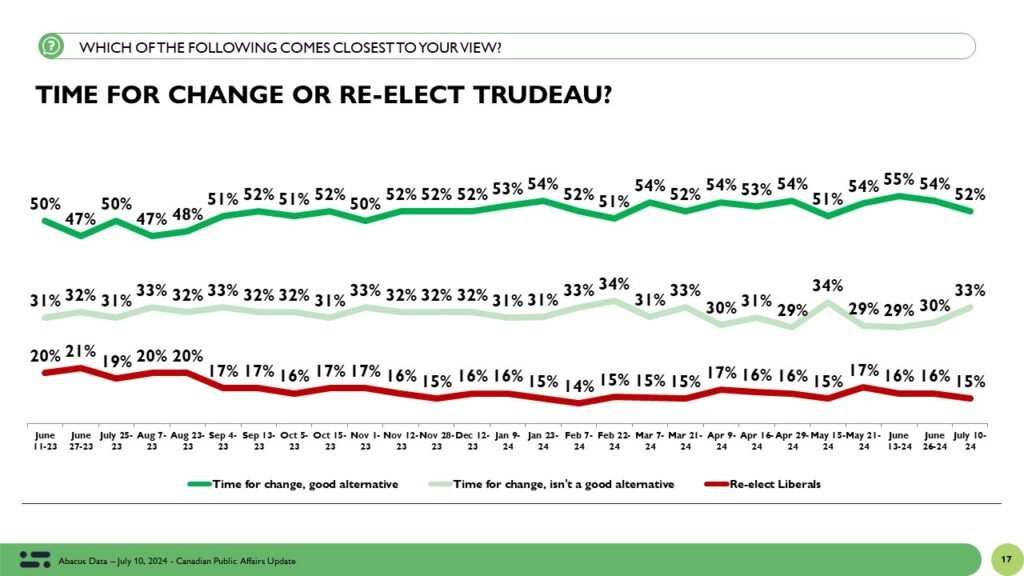
Impressions of Justin Trudeau remain fairly statics but somewhat more negative than last wave.. 59% have a negative impression of the Prime Minister, 1 point up from our last survey, while 24% have a positive view for a net score of -35.
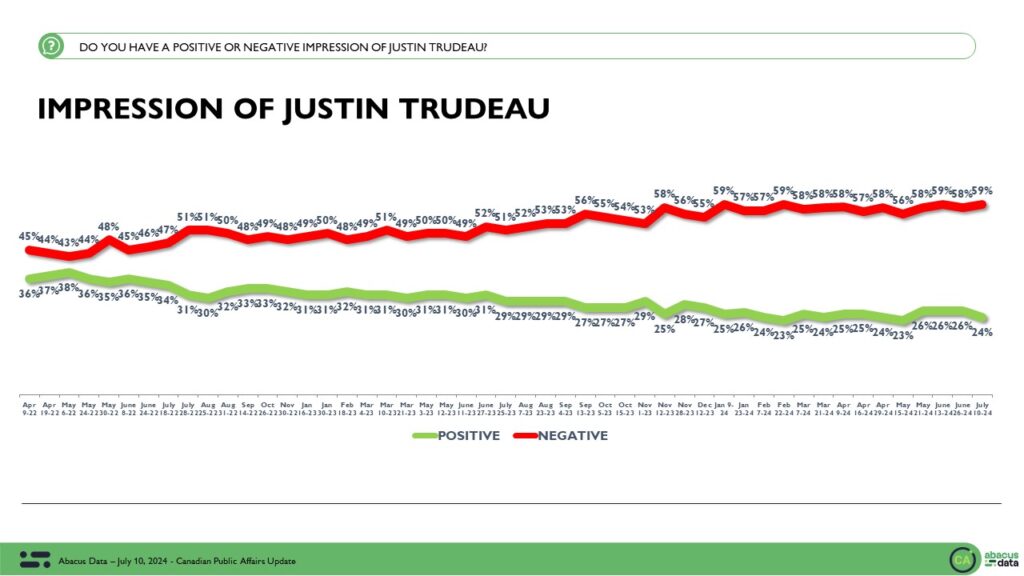
Impressions of Pierre Poilievre also hold steady – 38% have a positive impression (1 down from our last survey), while 37% have a negative impression (1 point up) for a net score of +1.
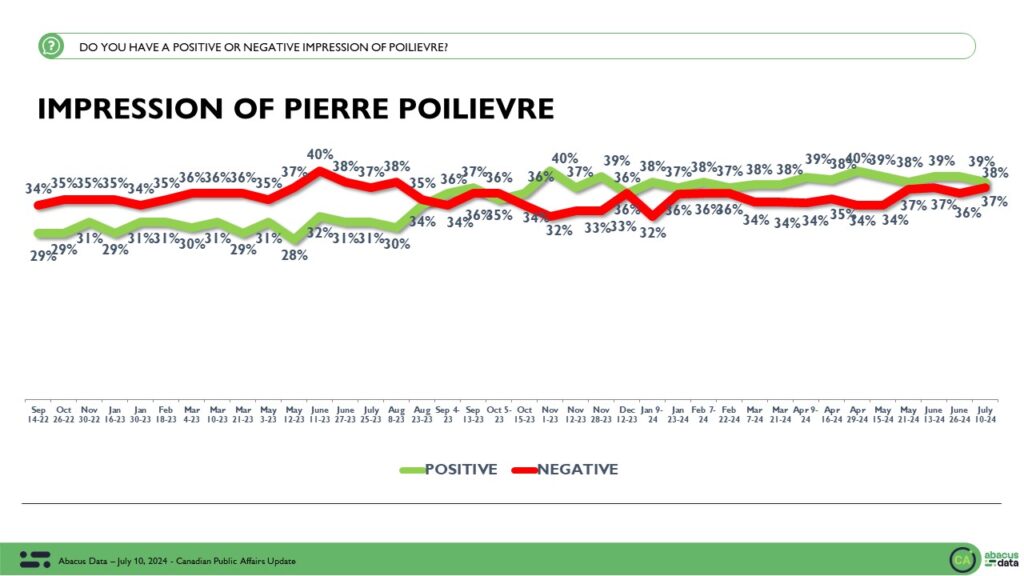
Perceptions about NDP Leader Jagmeet Singh are similarly consistent and continue to have a favourable net score. Our last survey was the first time since April that Mr. Singh’s net score was positive.
35% having a negative view (unchanged since our last survey), and a slight decrease in negative impressions with 34% (down 1 point), with a net score of -1.
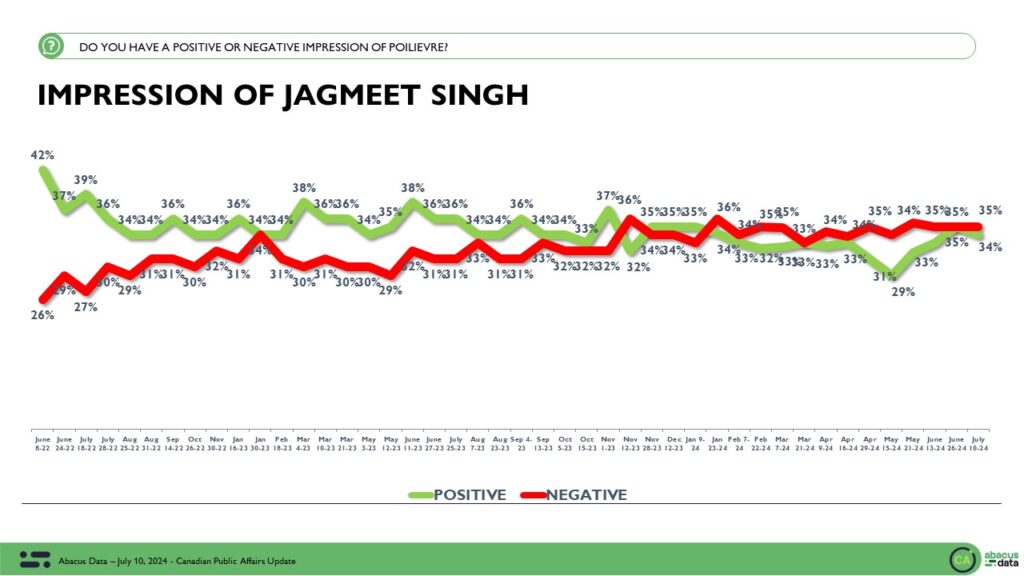
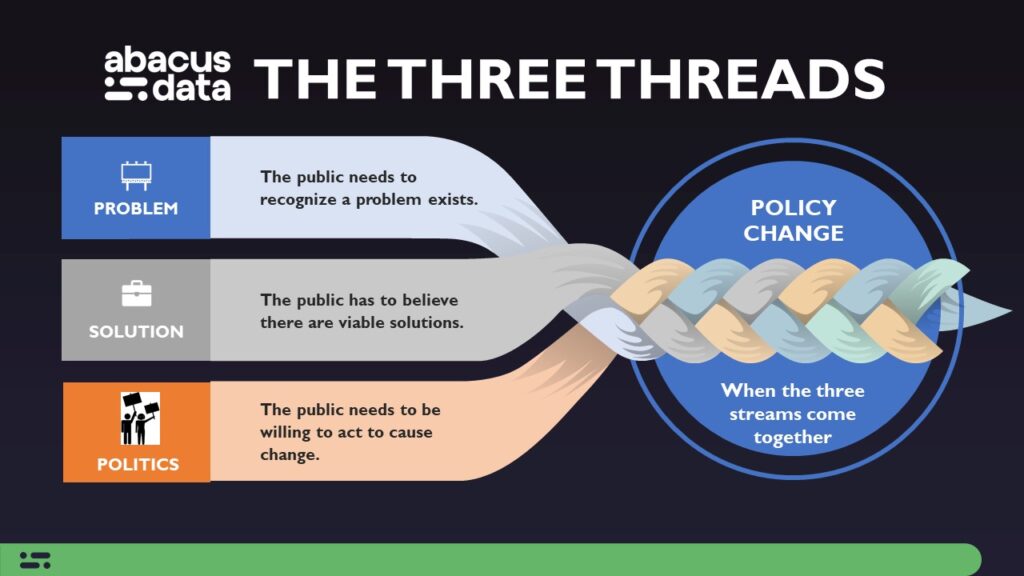
at polling for public affairs and advocacy.
The Mood of the Country
Despite largely unchanged voting intentions and a static pool of accessible voters, the general mood of the country has become more negative over the last month. Today, only 23% feel the country is headed in the right direction, down from 27% in June and reaching the low point in our tracking.
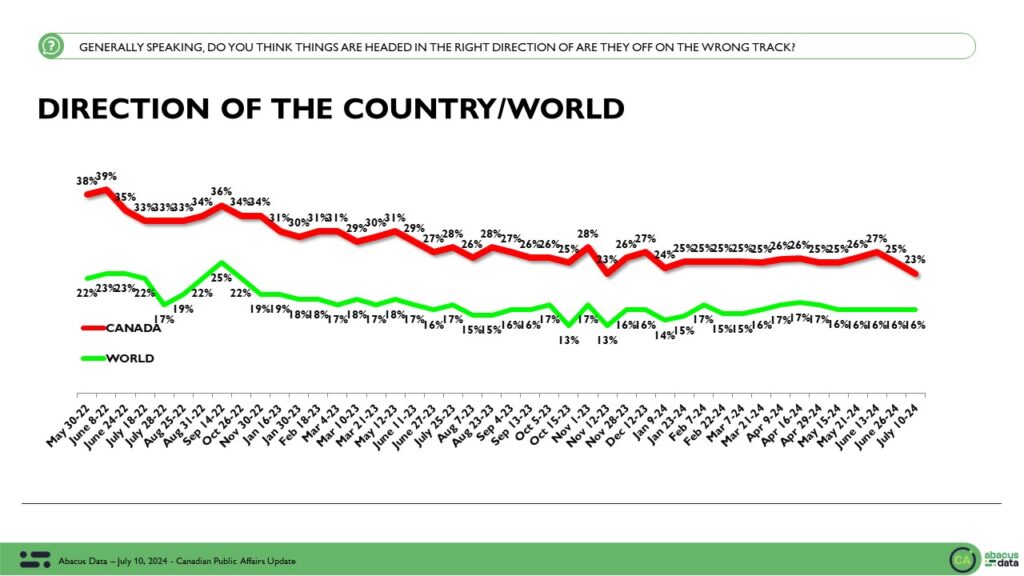
The Toronto-St. Paul by-election
In this edition, we also asked Canadians about the Toronto-St. Paul’s byelection, which marked the first time since 1993 that a Conservative MP has been elected for the riding.
The stunning loss of this Liberal stronghold made headlines across Canada. This is reflected in Canadians’ awareness of the byelection, 67% know the Liberals lost the Toronto-St. Paul’s byelection.
We find, however, that awareness of the by-election results is tightly linked to age. Among those aged 18 to 29, an overwhelming majority (64%) are unaware of the by-election, in contrast to those 60 and over, where only 12% are unaware.
In terms of party affiliation, those who identify NDP are more likely to be unaware of the Toronto-St. Paul’s by-election (49%), while Conservatives are most likely to know about the byelection (72%).
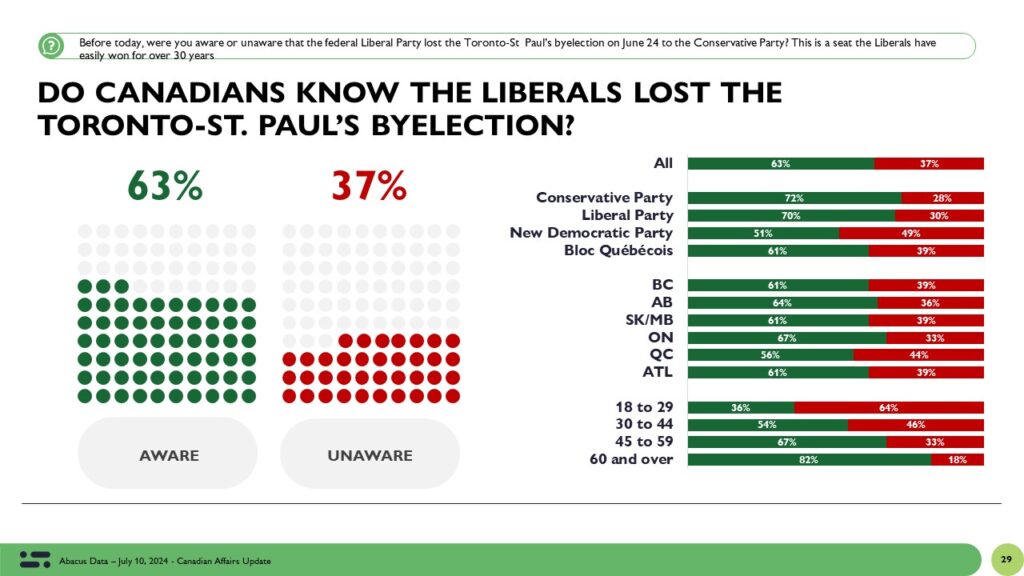
Importantly, we also find that awareness of the byelection outcome contributes to expectations about who might win the next federal election.
Those aware of the Toronto-St. Paul’s by-election are more likely to think the Conservatives will win the next election (58%) than those unaware.
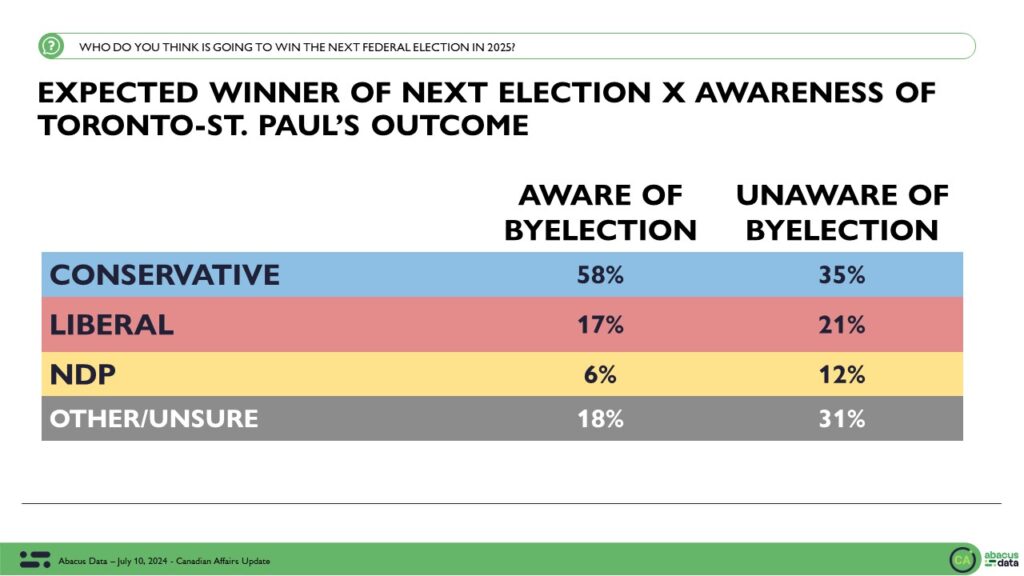
The Upshot
According to Abacus Data CEO David Coletto: “Now that the Toronto-St. Paul’s byelection loss has settled into people’s minds, we find little change in the overall orientation of Canadians to their political choices in Ottawa.
The Conservatives are ahead by 20 points, the Prime Minister remains deeply unpopular, and the desire for change is broad and fairly deep.
The mood of the country has soured to some extent over the past four weeks despite an interest rate cut. Weak employment numbers means we may see a shift in public mindset from one where the cost of living and affordability are the primary concerns to one where job security is front and centre. This climate will continue to put pressure on the incumbent Liberal’s support and reinforce the public’s desire for change.”
Methodology
The survey was conducted with 1,989 Canadian adults from July 4 to 9, 2024. A random sample of panelists were invited to complete the survey from a set of partner panels based on the Lucid exchange platform. These partners are typically double opt-in survey panels, blended to manage out potential skews in the data from a single source.
The margin of error for a comparable probability-based random sample of the same size is +/- 2.1%, 19 times out of 20.
The data were weighted according to census data to ensure that the sample matched Canada’s population according to age, gender, educational attainment, and region. Totals may not add up to 100 due to rounding.
This survey was paid for by Abacus Data Inc.
Abacus Data follows the CRIC Public Opinion Research Standards and Disclosure Requirements that can be found here: https://canadianresearchinsightscouncil.ca/standards/
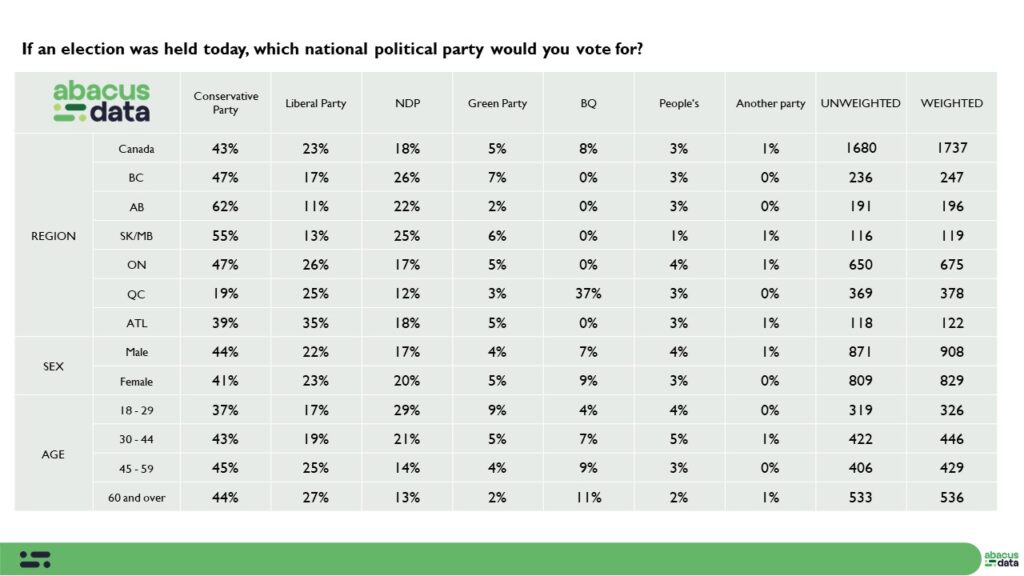
ABOUT ABACUS DATA
We are Canada’s most sought-after, influential, and impactful polling and market research firm. We are hired by many of North America’s most respected and influential brands and organizations.
We use the latest technology, sound science, and deep experience to generate top-flight research-based advice to our clients. We offer global research capacity with a strong focus on customer service, attention to detail, and exceptional value.
And we are growing throughout all parts of Canada and the United States and have capacity for new clients who want high quality research insights with enlightened hospitality.
Our record speaks for itself: we were one of the most accurate pollsters conducting research during the 2021 Canadian election following up on our outstanding record in the 2019, 2015, and 2011 federal elections.
Contact us with any questions.
Find out more about how we can help your organization by downloading our corporate profile and service offering.


